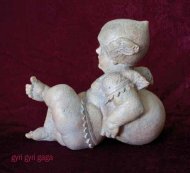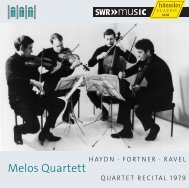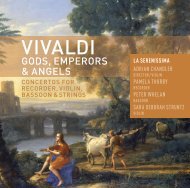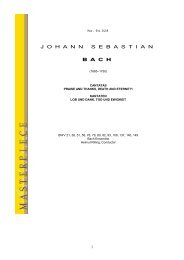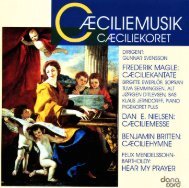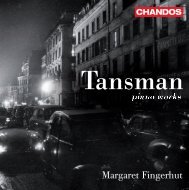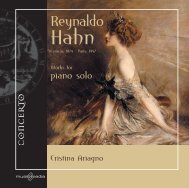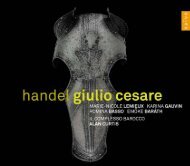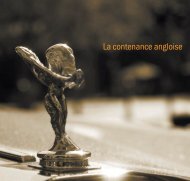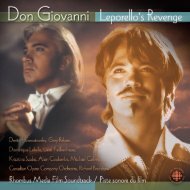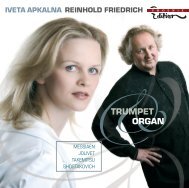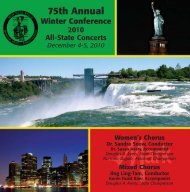You also want an ePaper? Increase the reach of your titles
YUMPU automatically turns print PDFs into web optimized ePapers that Google loves.
The Concert Singen<br />
From the beginning Else Brems was among the tavourites<br />
of Radio Denmmk. Her voice was exceptionally well<br />
suited to this medium, whateverthe genre.At the populil<br />
concerts in the "New Theatre". for many years the<br />
domicile ofthe radio orchestra, to-day part ofThe Royal<br />
Theatre, she often sang in operettas, and at the impoftant<br />
classical concerts. especially the "Thursday night''<br />
concerts, she was a regulil guest perfomer In 1942 EIse<br />
Brems sang Ravel's S hd hdrazade with Emest Ansemet<br />
on the podium. Later. she herself told how uneasy<br />
Ansermet had felt that a Danish singer had been chosen<br />
for these songs which are so closely interlocked with<br />
the French language. Ansermet, who was a heavy<br />
smoker, was mollified by a couple of packets of<br />
cigarettes, difficult to come by in a period of war and<br />
rationing. With her usual modesty, Else Brems did not<br />
reveal what he said when he had heard her: but the<br />
performance was a huge success. "How exquisitely her<br />
dark, soulful voice matched these songs; how sugge<br />
stive of mellow, tropical colours with a hint of temperament<br />
underlying the slow rhythm. It was marvellous",<br />
wrote the music critic Kai Flor. She sang the<br />
Shdhdrazade songs again in 1945 with the Radio<br />
Symphony Orchestra and ErikTuxen, and in 1947 with<br />
the Russim-Norwegian conductorlssay Dobrowen.The<br />
two songs recorded here from a private recording are<br />
probably from this pefomance (I,14&15). In 1953 she<br />
was awarded the distinguished Ingenio et Arti medal,<br />
and the very next day she was the soloist at a radio<br />
concert conducted by Paul Klecki in Brahms's A/to<br />
Rhapsody. She sang "with a moving expressiveness,<br />
illuminating every detail ofthe work" (I.I6).<br />
Else Brems was a frequent guest soloist in the other<br />
Scandinavian countries, as well as in Danish provincial<br />
towns, and in the Tivoli Gardens in Copenhagen.<br />
The Liedsinger.<br />
Throughout her career Else Brems adhered to the pattem<br />
set at her d6but in 1928: classical Italim and French<br />
arias, German lieder, mainly Schubert and Brahms,<br />
French songs, especially by Debussy, Faur6, and Ravel,<br />
and Danish romances by Peter Heise and PE.Lange-<br />
Miiller.<br />
Singers normally use the l8th-century Italian<br />
canzonetta for their warm-up only, but to Else Brems<br />
these meant much more. Indeed. she often used them<br />
as the principal items in her progrmme at orchestral<br />
concerts. As a representative of this genre, we have<br />
included here an old French aria, "L'Amour de moi",<br />
as a perfect example of her beautiful and carefully<br />
worked out phrasing (II,8). Anders Brems loved the<br />
German Lied, Schubert and Brahms in particular, and<br />
this love he transmitted to his daughter. Lied,lovers<br />
will krow how difficult the interpretation ofSchubert's<br />
songs is. They demand a sympathetic naturalness in<br />
voica and expression difficult to master by myone but<br />
an artist of EIse Brems's calibre. In 1955 she did her<br />
first and only LP-record with exclusively Brahms and<br />
Schubert songs. From this award-winning record is<br />
included here the "Liebesbotschaft" (II, t). "Der<br />
Lindenbaum" and 'Die Forelle" are both from a private<br />
recording of a radio transmission from about l950<br />
(II,2&3), as are also two songs by Brahms (II,4&5),<br />
and two by Grieg (II.6&7).<br />
One of the results of her sojoums in Paris was her<br />
mastery of the French language and singing style. She<br />
contrnued her studies with the internationally<br />
recognized, Danish-born Povla Frijsh who was<br />
renowned for her interpretations ofFrench vocal music.<br />
Else Brems often included French songs in her lied<br />
programmes, also when she toured the Danish<br />
provincial towns, and in her radio perfomances. Sadly.<br />
in spite ofthis, we only possess recordings of the three



